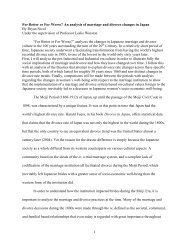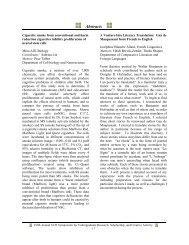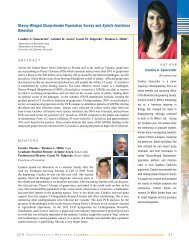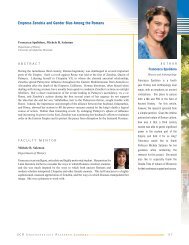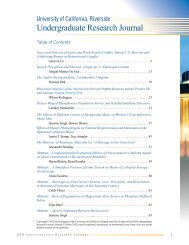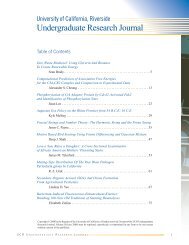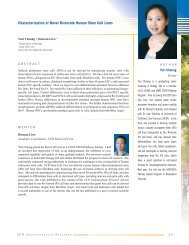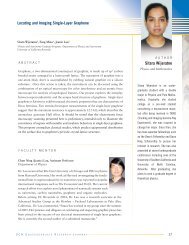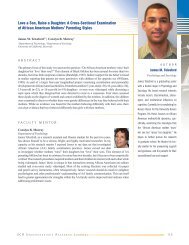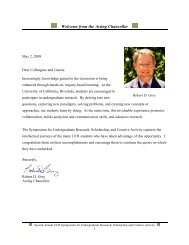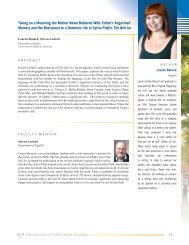2010 - Undergraduate Research, Scholarship and Creative Activity
2010 - Undergraduate Research, Scholarship and Creative Activity
2010 - Undergraduate Research, Scholarship and Creative Activity
You also want an ePaper? Increase the reach of your titles
YUMPU automatically turns print PDFs into web optimized ePapers that Google loves.
Helmholtz-Smoluchowski relation was then<br />
used to determine the zeta potential. The<br />
experiments were done under different ionic<br />
strength across targeted <strong>and</strong> non-targeted<br />
M cells. The results were correlated to uptake<br />
studies of PLGA nanoparticles <strong>and</strong> were used to<br />
elucidate the significance of M cell electrostatic<br />
properties on microparticle uptake for mucosal<br />
vaccine therapies.<br />
The Effects of Caffeine <strong>and</strong> Nicotine on<br />
Learning<br />
Daniel Khafi, Psychology<br />
Mentor: Aaron Seitz<br />
Department of Psychology<br />
The vast majority of the population indulges in<br />
either caffeine or nicotine intake. However, so<br />
far there is little research regarding the effects of<br />
such drugs on learning. The current study aims<br />
to underst<strong>and</strong> how what people drink or smoke<br />
in-between learning <strong>and</strong> recall can impact their<br />
consolidation of learning. A previous study by<br />
Mednick et al., (2008) suggested a counter<br />
intuitive role of caffeine in the consolidation of<br />
learning, where a moderate dose of caffeine<br />
impairs declarative verbal memory <strong>and</strong> motor<br />
sequence learning, but simultaneously increases<br />
perceptual learning. This counter intuitive effect<br />
of caffeine directly challenges the widely held<br />
belief that caffeine enhances cognitive<br />
performance. Mednick et al., (2008) suggested<br />
that the primary action of caffeine on<br />
consolidation was via acetylcholine processes in<br />
the brain. Our hypothesis is that acetylcholine<br />
differentially impacts consolidation of<br />
hippocampus dependant <strong>and</strong> neocortical<br />
dependant learning processes, <strong>and</strong> that caffeine<br />
<strong>and</strong> nicotine, which impact different aspects of<br />
the acetylcholine system, will differentially<br />
impact learning in each of these brain regions.<br />
This hypothesis is being tested by training<br />
subjects on a word-pair associate task, learning<br />
of which is known to be hippocampus<br />
dependant, <strong>and</strong> a visual texture discrimination<br />
task, learning of which is known to be dependant<br />
on visual cortex. Following the training subjects<br />
will be given either nicotine, caffeine, placebo or<br />
nothing <strong>and</strong> their retention of learning is tested<br />
on the following day. We will present the<br />
preliminary results of this research <strong>and</strong> discuss<br />
the relevance of these results.<br />
Impunity in Argentina’s Political Institutions<br />
Ivan Krimker, Political Science<br />
Mentor: William T. Barndt<br />
Department of Political Science<br />
In Argentina‘s democratic system there is a<br />
relatively free press, justice system, <strong>and</strong> free <strong>and</strong><br />
fair elections. However, instances of blatant<br />
corruption at high levels of office have<br />
undermined the strength of the institutions <strong>and</strong><br />
tested citizens‘ tolerance for abuse of power.<br />
Some individuals have been able to act with<br />
total impunity <strong>and</strong> still remain relevant in the<br />
political arena, as in the case of Carlos Saul<br />
Menem, the former president of Argentina.<br />
Others have paid a high price, as did Menem‘s<br />
Secretary of Environmental Issues, Maria Julia<br />
Alsogaray. Why is this the case? What<br />
differentiates one case from the other? And<br />
what facilitates impunity <strong>and</strong> what does not?<br />
Can we design a system that can prevent it from<br />
happening in the future? By isolating several<br />
cases of impunity <strong>and</strong> comparing them to<br />
instances where accountability was present, this<br />
research will attempt to draw some general<br />
conclusions about impunity. Ultimately,<br />
impunity in Argentina is not the result of merely<br />
cultural undertones in the psyche of the average<br />
Argentine citizen. Instead, it is the result of a<br />
slow <strong>and</strong> inefficient legal system <strong>and</strong> the<br />
complicity of high level officials who benefit<br />
from loose rules <strong>and</strong> weak institutions.<br />
Establishing a system of horizontal checks <strong>and</strong><br />
balances can avert uncontrolled corruption. A<br />
focus on a de facto <strong>and</strong> not just a de jure<br />
separation of the government branches <strong>and</strong>,<br />
more importantly, the strengthening of the legal<br />
system can provide a strong deterrence to all<br />
officials seeking impunity, regardless of their<br />
rank.<br />
Fourth Annual UCR Symposium for <strong>Undergraduate</strong> <strong>Research</strong>, <strong>Scholarship</strong> <strong>and</strong> <strong>Creative</strong> <strong>Activity</strong><br />
36



